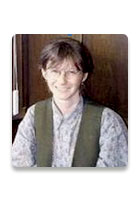Plenary Speakers IWoDA'13
Archer, Dawn (Pre-Workshop Practical Sessions)
Discourse Analysis: Exploring Data with WMatrix
Read more

Professor of Pragmatics and Corpus Linguistics at the School of Journalism, Media & Communication, University of Central Lancashire, much of her research relates to “spoken” interaction as it appears in (speech-based) historical texts. This work brings together corpus linguistics, sociolinguistics, historical linguistics, and pragmatics. She has explored in some detail the area of the historical courtroom and is currently developing a corpus of 19th centrury English trial texts (Archer (2005), Historical Sociopragmatics: Questions and Answers in the English Courtroom; Archer (2006), (Re)initiating strategies: Judges and defendants in Early Modern English courtrooms). She has co-developed a scheme for identifying and annotating requests in historical texts (Culpeper and Archer (2008), Requests and directness in Early Modern English trial proceedings and play-texts). She is also working with Dr Paul Rayson, Lancaster University) to retrain the UCREL semantic annotation system (a tool that combines part-of-speech and semantic tagging) so that it automatically analyses historical texts from 1600. They have been awarded one British Academic grant . More recently, she has become interested in Press reportage, specifically the reportage of “terror” and construction and (re)presentation – especially relating to ethnic minorities.
For further details, please visit her personal website
Emmott, Catherine
Foreground and Background in Written Texts: Discourse Strategies and Cognitive Processing
Read more

Senior Lecturer in the Department of English Language at the University of Glasgow, where she has been based since 1989. She is also Director of the STACS Project – Stylistics, Text Analysis and Cognitive Science: Interdisciplinary Perspectives on the Nature of Reading which combines stylistic analysis and empirical testing to investigate topics attention-controlling devices, perspective, and reference items in narrative. Her main research interests are in the mental processing of text, discourse anaphora, and stylistics as reflected in Narrative Comprehension: A Discourse Perspective (1997), which draws on insights from discourse analysis and artificial intelligence to build a detailed model of how readers build, maintain and use mental representations of fictional contexts. Dr. Emmott has also published articles on text analysis, stylistics, and reference theory. She has been involved in developing the area within Stylistics called Cognitive Stylistics (also known as Cognitive Poetics) and has contributed to key edited volumes in this area, such as Herman’s (2003) Narrative Theory and the Cognitive Sciences, Gavins and Steen’s (2003) Cognitive Poetics in Practice, Louwerse and van Peer’s (2002) Thematics: Interdisciplinary Studies, and Semino and Culpeper’s (2002) Cognitive Stylistics: Language and Cognition in Text Analysis. Her book Mind, Brain and Narrative (2012, with A.J. Sanford) provides an overview of the STACS Project. She is Assistant Editor of the journal Language and Literature.
For further details, please visit her personal website
Fogarty, Anne
Reading First-Person Narratives: Trauma and Femininity in Contemporary Irish Fiction
Read more

Professor of James Joyce Studies at University College Dublin and Director of the UCD Research Centre for James Joyce Studies (www.ucd.ie/joyceresearchcentre). From 2002 to 2009, she was General Editor of the Irish University Review (www.irishuniversityreview.ie). In 2008, with Dr Luca Crispi, she founded the Dublin James Joyce Journal. Since 2008, she has been President of the International James Joyce Foundation. In 2008, she was awarded the first Charles E. Fanning Prize by Southern Illinois University, Carbondale for her contributions to the field of Irish Studies. She is currently completing a study of the poetry of Eavan Boland and a monograph on the socio-historical contexts of Ulysses, entitled James Joyce and Cultural Memory: Reading History in Ulysses.
For further details, please visit her personal website
Hilpert, Martin (Pre-Workshop Practical Sessions)
Statistical Methods in Language and Linguistic Research
Read more

Assistant Professor of English Linguistics at the University of Neuchâtel. He holds a PhD from Rice University and did postdoctoral research at the International Computer Science Institute in Berkeley and at the Freiburg Institute for Advanced Studies. He is interested in cognitive linguistics, language change, construction grammar, and corpus linguistics and has published a number of articles on these research areas in International Journal of Corpus Linguistics, Review of Cognitive Linguistics, Corpora or Corpus Linguistics and Linguistic Theory and Functions of Language. He has also contributed to edited volumes such as Nevalainen and Traugott’s (2012) The Oxford handbook of the history of English; Robynson and Allan’s (2012) Current Methods in Historical Semantics; Butter, Birke and Köppe’s (2011) Counterfactual thinking / counterfactual writing; or Heine and Narrog’s (2011) The Oxford Handbook of Grammaticatization.
For further details, please visit his personal website
Knight, Sara
Richard III and Elizabethan Drama
Read more

Sarah Knight’s academic background is in Classics and English. Her main research and teaching interests are in sixteenth and seventeenth century English and Latin literature, particularly works written at or about early modern institutions of learning. Her research currently concentrates on Renaissance students, representations of adolescence, poetic and rhetorical pedagogies, and academic drama and disputation. Dr Knight has edited and translated several Latin works, including Leon Battista Alberti’s Momus (1440s) and the accounts of Elizabeth I’s visits to the University of Oxford in 1566 and 1592. Her current work includes an edition and translation of Milton’s Prolusions, the English editions of Fulke Greville’s plays and the play The New Moone, and two edited books, The Oxford Handbook of Neo-Latin and The Brill Companion to Ramism. She oversees the online publication of a teaching anthology of neo-Latin texts. She is President of the Society for Neo-Latin Studies, a member of the International Association of Neo-Latin Studies, and a founder member and Steering Committee member of the East Midlands Early Modern Colloquium. She co-founded the ‘Studies in Youth’ network. She sits on the Board of Advisors for the journal Renaissance Studies, the Editorial Board for Literature Compass, and the OCR English Consultative Forum.
For further details, please visit her personal website
Leech, Geoffrey
English Grammar on the Move
Read more

Emeritus Professor in the Department of Linguistics and English Language, Lancaster University, since 2002. He was Professor of Linguistics and Modern English Language at Lancaster University from 1974 to 1996. He then became Research Professor in English Linguistics. His main research area is English linguistics. Since 1970 he has been engaged in research on computer corpora, including the compilation of the LOB Corpus and the BNC (British National Corpus). Corpus linguistics over the decades has converged with English grammar, another of his major research interests. Apart from this, he has worked on pragmatics, where his interest has above all been in the linguistic theory of politeness.
Recently he has returned to literary stylistics/poetics, a field to which he contributed from the 1960s, and on which he has collaborated with Lancaster colleague Mick Short. He has written, co-authored or co-edited over 30 books and over 120 articles and papers in the areas of English grammar, literary stylistics, semantics, computational linguistics, corpus linguistics and pragmatics.
Among his most recent publications are:
- Rayson, Hoffmann and Leech (eds.)(2011) Methodological and Historical Dimensions of Corpus Linguistics
- Hoffmann, Rayson and Leech (eds.)(2012) English Corpus Linguistics: Looking Back, Moving Forward
- Leech (2010) Analysing literature through language: Two Shakespearean speeches. In McIntyre and Busse (eds.)
- Leech (2011) Frequency, corpora and language learning. In: Meunier, De Cock, Gilquin and Paquot (eds.)
- Leech (2011) The modals ARE declining: Reply to Neil Millar’s “Modal verbs in TIME: Frequency changes 1923-2006”, International Journal of Corpus Linguistics
- Leech (2011) ‘Principles and applications of corpus linguistics’. In Viana, Zyngier, and Barnbrook (eds.) Perspectives on Corpus Linguistics Controversies
- Leech, G., N. Smith and P. Rayson (2012) ‘English style on the move: Changing stylistic norms in the twentieth century.’ In M. Kytö (ed.) English Corpus Linguistics: Crossing Paths.
For further details, please visit his personal website
Pullum, Geoffrey
Discourse, Usage, and the English Passive Constructions
Read more

Professor of General Linguistics at the University of Edinburgh since 2007, and appointed Visiting Professor of Cognitive, Linguistic and Psychological Sciences at Brown University in 2012. He is a linguist with broad scholarly interests in language, especially the grammar of Standard English. He has taught linguistics at University College London, the University of Washington, and Stanford University, and then took a permanent position as a professor in the Department of Linguistics at the University of California, Santa Cruz (UCSC). He was elected a Fellow of the American Academy of Arts and Sciences in 2003, and was a Fellow of the Radcliffe Institute for Advanced Study at Harvard in 2005-2006.
He has published about 250 articles and books, ranging from technical work on syntactic theory to a handbook on phonetic transcription (Phonetic Symbol Guide, 2nd edition 1996) and a collection of satirical essays about the study of language, (The Great Eskimo Vocabulary Hoax, 1991). The Cambridge Grammar of the English Language (by Rodney Huddleston and Geoffrey K. Pullum, Cambridge University Press), a detailed description of the linguistic structure of international standard English, appeared in 2002 and was awarded the the Linguistic Society of America’s Leonard Bloomfield Book Award in January 2004. Since then two other books have appeared: A Student’s Introduction to English Grammar (a textbook jointly authored with Rodney Huddleston in 2005) and Far From the Madding Gerund (a collection of Language Log posts jointly authored with Mark Liberman; William, James & Co., 2006).
For further details, please visit his personal website
Regan, Stephen
The Politics of Poetry and the Counter-Cultural Discourse of the Sonnet
Read more

Stephen Regan is Professor in the Department of English Studies at the University of Durham. He was Lecturer in Modern Poetry at Royal Holloway, University of London, for four years, and also worked at Ruskin College, Oxford and The Open University. He was a Visiting Professor at the University of Santiago de Compostela in 2004, and has been a visiting lecturer at Jagiellonian University in Krakow, Poland, and at Columbus State University in Georgia, USA. His main teaching and research interests are modern poetry, modern Irish literature and literary theory. His publications include essays on W.B. Yeats, Seamus Heaney and Robert Frost, two books on Philip Larkin, an edition of George Meredith’s Modern Love, and a forthcoming critical study of the sonnet from Shakespeare to Heaney. He is the editor of Irish Writing: An Anthology of Irish Literature in English 1789-1939 in the Oxford World’s Classics series. Stephen Regan is Director of The Centre for Poetry and Poetics, which encourages research on the Basil Bunting Archive and other poetry archives in the Palace Green Library at Durham.
For further details, please visit his personal website
